Doubts raised about water bill in Tuba City
First forum focuses on PowerPoint presentation, questions and comments from citizens
By Alistair Mountz
Special to the Times
TUBA CITY, May 19, 2012
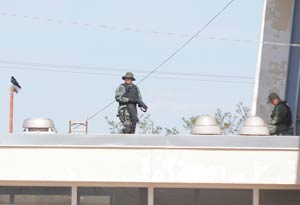
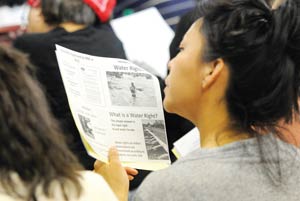
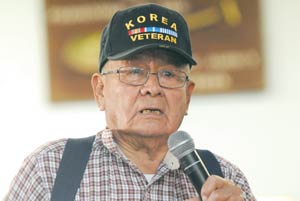
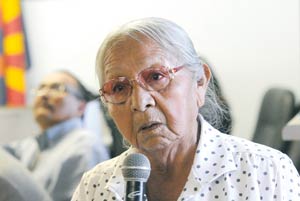
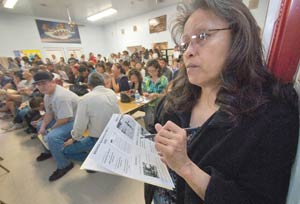
(Special to the Times - Donovan Quintero)
TOP: Navajo Nation Police officers keep watch from a rooftop Tuesday during the first public forum on SB 2109. Citizens from as far away as
SECOND FROM TOP: A citizen reads information handed out at the forum on SB 2109 at the Tuba City Chapter House.
THIRD FROM TOP: Robert Begay from Bodaway-Gap, Ariz., addresses to President Ben Shelly and other officials Tuesday at the Tuba City Chapter House.
FOURTH FROM TOP: Mary Martin, 81, from Tuba City, speaks at the first forum on SB 2109 Tuesday at the Tuba City Chapter House.
FIFTH FROM TOP: A citizen takes notes Tuesday during the first forum on the water rights settlement at the Tuba City Chapter House in Tuba City.
Santiago Montoya, 20, wearing a black bandana over his face like an old time bandit and wearing "I Love Hater" socks, came to the first town hall meeting on the Navajo-Hopi Little Colorado River Settlement Agreement to support the protesters and represent himself.
Sue Sutter, whose mom lives in Cameron, Ariz., flew in from Washington state to do anything possible to stop SB 2109, the settlement bill, from becoming law.
Bob Robbins, who lives about a mile from the Little Colorado River in Cameron, came because although he supports opponents of the agreement, he wanted to hear what was said.
Robert Begay, a member of Forgotten People, an organization that helps those impacted by the Bennett Freeze, came with three pages of concerns he eventually read to the leaders assembled for the town hall, held Tuesday at the Tuba City Chapter House.
President Ben Shelly was there with the most important agenda of all.
Unfortunately, most attendees left the meeting wondering what his vision really is, and were deflated by the fact it appears as though the settlement is a done deal despite Shelly's previous statements to the contrary.
"What I'm hearing is, you're advocating for what you've already settled, not what we have settled," Gerald Tsosie said to loud applause. "When you present this settlement and want us to decide, you should tell us the pros and cons. Then you're presenting something to us that we can decide on.
"You're advocating what you agreed to," he said. "Give us a chance for input into the negotiations and what you're talking about."
The meeting lasted well over five hours, and was more civil than the protests that greeted Shelly following a meeting April 5 in Tuba City with the settlement bill's sponsors, U.S. senators Jon Kyl and John McCain, both Arizona Republicans.
The town hall consisted of a 90-minute PowerPoint presentation by Navajo Water Rights Commission members Ray Gilmore and Leo Manheimer, with occasional input from Shelly.
Their presentation was followed by a question-and-answer session that lasted well into the night. Nearly 300 people officially attended, but the maximum occupancy law allowed only 229 to be in the chapter house at one time.
The 44-frame PowerPoint covered a variety of topics including what a water right is, specifics about water projects in Leupp and Dilkon that would be authorized under the settlement, and details about the aquifers that would supply those projects.
Most of the topics are covered in a frequently asked questions press release issued by the president's office April 17. (See Page A-2)
Who decides?During the presentation leaders emphasized one key point: The Navajo Nation's water rights must be finalized and only two options are available.
Either approve a settlement agreement between all Little Colorado River users that dictates how much water the Navajos are entitled to, or continue litigating in state court and let the judge decide how much water the Navajos should get.
None of the leaders in attendance, including Vice President Rex Lee Jim, Council delegates Joshua Butler, Duane Tsinigine, Leonard Tsosie, and Jonathan Nez, took a stand in favor of the settlement agreement and instead insisted that it was ultimately up to the people.
The problem, Tsosie said, is whether it will be truly a decision by the people.
"This should be decided by referendum so the people truly decide," said Augusta Gillwood, of Coal Mine Chapter, during the question-and-answer session. "Did our ancestors go to Hwééldi for nothing? We shouldn't accept what's just being handed to us. This agreement should have been drafted by Navajos."
Butler tried to calm fears on this point, but didn't mention a referendum.
"Ultimately, the Council is going to have to make a yea-or-nay decision on this," Butler said. "But I am listening. I'm getting texts and emails, Tweets and Facebook messages and I am listening to all of them."
Gillwood and Gerald Tsosie weren't the only ones concerned about how the settlement agreement will be approved and how much input the average Navajo has.
Leonard Gorman, executive director of the Navajo Nation Human Rights Commission, also expressed concern.
On April 6, the day after protesters descended upon Tuba City for the Kyl-McCain visit, the water commission did a presentation for the Navajo Nation Human Rights Commission.
Following the presentation, human rights commissioners explained the standard of "free, prior and informed consent," as contained in the United Nations Declaration of Human Rights of Indigenous Peoples.
Gorman then recommended "that the Navajo people initiate a petition and decide 'yes' or 'no' to the water rights settlement introduced by Senator Kyl. By not exercising this right it may ultimately indicate the Navajo people are leaving it up the Navajo Nation Council to decide."
More than one path
Gorman said a Council vote could meet the declaration's standard of consent, but there are other options available to the average Navajo to make sure it is met.
"Alternatively, the Navajo people may give their consent by vote either through the referendum process, where the Navajo Nation Council chooses to place the matter on a ballot, or through the initiative process where the Navajo people petition for the matter to be placed on a ballot," he said.
"First, the Navajo-Hopi Little Colorado River Water Rights Settlement Act of 2012 terms must be disclosed," Gorman said. "The Navajo people have the right to know the terms of the settlement agreement because they are the stakeholders of the resources on the Navajo Nation.
"Second, the terms of the agreement should be translated into Navajo and relayed to all people who use water and would be impacted by the settlement.
"Third, the water settlement should be reconciled against traditional Navajo water customs and use to determine if the traditional customs and usage is damaged by the settlement," he said.
There were few specific questions and fewer specific answers during Tuesday's Q-and-A. Most speakers exceeded the five-minute time limit and used it as an opportunity to express their personal concerns, and leaders typically answered by referring back to the PowerPoint presentation.
A large police presence was evident around the chapter house, which included SWAT officers on the roof of the Boys & Girls Club adjacent to the chapter house.
Speakers were concerned about the rush to approve the deal, the resistance to acknowledging the spiritual nature of water, and how the federal government is going to pay for the promised water projects during a time of federal budget cuts.
One question that did get answered came from Milton Tso, 41, who lives "right behind" the Little Colorado River in Cameron.
"President Shelly I have a question for you," he said dramatically. "Let's say you and Jon Kyl and John McCain are all stranded in the desert. There's one water bottle between you. You think they're going to share that one bottle with you?"
When Shelly had a chance to respond, he did so with humor: "Those two guys are pretty old. I think I'll just beat them up and take the bottle."

